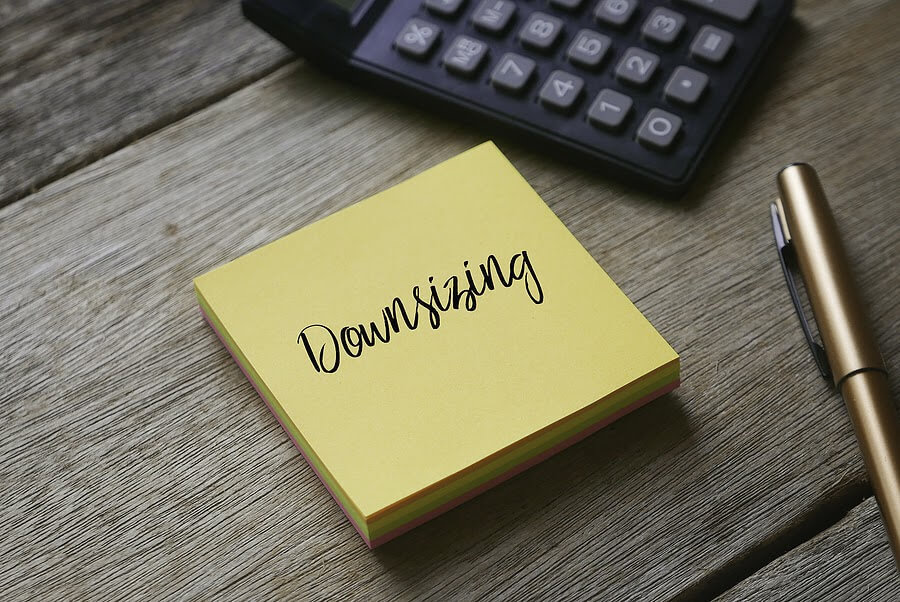Downsizing is hard. No matter how you slice it, it’s a difficult process to prepare for, go through, and recover from. Here at BHGRE Steinborn & Associates, we know that downsizing is often a necessary part of finding your perfect place, so we want to give you our perspective on how to downsize in a way that minimizes frustration and stress.
Throughout this post, you’ll see tips from Amy Hummer, the owner of BHGRE Steinborn & Associates and our downsizing expert! Here’s her first tip:
Amy’s #1 tip for downsizing:
This may sound impossible, but I really want you to enjoy the process! By downsizing your belongings, you’ll discover forgotten items that will bring good memories to mind. Celebrate the change and start getting excited about where or what is next.
Start sooner rather than later
First and foremost, it’s better to start downsizing earlier rather than later. We recommend beginning the downsizing process at least six to eight months before your move date. This will give you ample time to practically think about which items you truly need and which ones you don’t.
If you leave important choices like this up to the whims of the last week in your home, the additional stresses of packing, loading, moving, and unloading will cloud out solid judgement. (And we say this from experience!) Starting early gives you the confidence of feeling prepared and the clarity to make good choices.
Amy’s tip for starting (and staying) organized:
As you downsize, create specific containers with the labels ‘Donations’ and ‘Dispose.’ Then, each week, empty the containers based on their designation. It keeps the process organized and efficient.
Assess your needs
Next, we recommend that you make a list of the top 10 needs your new living space must fulfill for you and your family. Don’t be discouraged if this task is more overwhelming than it first appears — that’s normal.
Here are our tips for prioritizing the needs of your new living space:
 1. Start with a broad need: For example, I want to be able to comfortably entertain in my new home, even though it’s smaller.
1. Start with a broad need: For example, I want to be able to comfortably entertain in my new home, even though it’s smaller.
2. Narrow your focus through observation: Pay close attention to the behaviors related to this general need. For example, if this were your need, use the next few weeks to intentionally focus on where your guests spend the majority of their time. Oh, I noticed my guest mostly relax in my living room.
3. Cross this need with other existing factors: For example, When I entertain, my guests like to eat, so my living room needs places where they can set down their food and drinks
4. Start creative problem-solving: Maybe you could use a coffee table that also functions as a storage unit, or maybe you could add a few small, portable end tables that can easily be moved to accommodate your guests.
List all your specific needs in one place: It’s okay to copy the list, but just be sure it’s not scattered across your phone, laptop, and sticky notes. Otherwise, the disorganization will lead to stress rather than focus.
Rank them on a scale of 1-10.
You may discover more than 10 needs, and that’s okay! But coming up with at least 10 needs focuses your attention and allows you to have practicality at the forefront of your mind while you downsize your belongings. This is your biggest asset in learning how to downsize, because it gives you the power to easily distinguish between what goes in the give-away pile and what stays in the keep pile.
Remove emotional attachments
This is definitely the hardest part of the downsizing process. Even people who are motivated to cut out all clutter and live in tiny homes run across sentimental items in packed away boxes that are a struggle to give up.
We’ve discovered that though it’s hard to say goodbye to old belongings, it’s much easier when you know it’s going to a place where it will continue to bring joy, value, and functionality to another person’s life. By beginning the downsizing process early, you can take the time to find the right homes for your beloved items.
We recommend reaching out to family, friends, local donation centers, and nonprofit organizations, because you’d be surprised how often your outdated items meet their needs! Savers and Goodwill are great locations in Las Cruces where you can drop off old items and see them bless another family.
 Amy’s tips for family heirlooms:
Amy’s tips for family heirlooms:
If you’ve been saving items of sentimental value for your children and family members, take this opportunity to give the items to them. If they choose to keep them or pass them on, that’s their prerogative, but either way your clutter is cleared! For things like family photos, meaningful documents, or important articles, consider digitizing your stash so that the whole family can enjoy them clutter-free.
Downsize one room at a time
When you’re trying to learn how to downsize effectively, the thought of sorting all your belongings is incredibly overwhelming. That’s why we recommend you start downsizing one room at a time. We also recommend that you begin the process with something easy, so that you can build your confidence and immediately check something off your list.
For example, if you only wear the same outfits week after week, maybe your closet would be an easy place to start. Or, if the laundry room has easy “give-away” and “keep” decisions, start there instead. Only you know the needs of your family and the rooms in your house, so trust your instincts and start downsizing with the easiest room.
When in doubt, ask for help!
When it comes down to it, some items will just be a struggle to get rid of, even after implementing all these tips on how to downsize. Ask a trusted friend, family member or your REALTOR to act as an impartial third party that can listen to your struggle and give you honest advice.
Because you know your needs better than anyone, we listed this as one of our last tips for a reason — try everything else first! But when you’re stuck, an outside opinion can really give you a beneficial perspective that helps you break the frustration of indecision.
After reading this post, you may still have questions or concerns about downsizing your living space. If that’s the case, please don’t hesitate to reach out to our incredible team here at BHGRE Steinborn & Associates. Contact us online or give us a call at 1-800-234-3698. We’re always happy to help!




